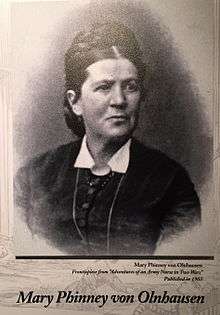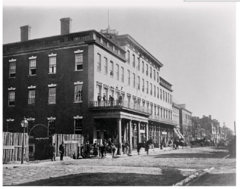Mary Phinney von Olnhausen
Mary Phinney von Olnhausen (1818–1902) was an American nurse, abolitionist, and diarist.[1] Historians look to the book extracted from her diaries -- "Adventures of an Army Nurse in Two Wars" to understand the medical techniques of the Civil War.[2]
Mary Phinney von Olnhausen | |
|---|---|
 Image of Phinney from the frontispiece of her posthumously published diaries. Phinney was in her mid to late forties during the Civil War. | |
| Born | 1818 Massachusetts |
| Died | 1902 |
| Nationality | United States |
| Occupation | nurse |
| Known for | Diarist who recorded 19th Century medical techniques |
| Parent(s) | Elias and Catherine Bartlett Phinney |

Born in Massachusetts to Elias and Catherine Bartlett Phinney, a lawyer and her mother the daughter of a doctor, Phinney was well educated at several academies. When her father died in 1849 at age 69, the farm was sold and she "sought employment as a designer of print goods" at the mills. There she met Gustav, Baron von Olnhausen (c. 1810–1860) who left Saxony after the 1848 unrest and financial troubles, which led to selling of his castle. He was making a meager living as a chemist in a dye-house of the Manchester Mills. They married when she was 40 years old on May 1, 1858 and he died two years later in 1860.[3]
During the US Civil War, von Olnhausen served as a nurse at the Mansion House Hospital in Alexandria, Virginia and Mansfield General Hospital at Morehead, North Carolina. After the war, she was discharged in August 1865, returning home to help raise her brother's children in Illinois. With the outbreak of the Franco-Prussian War in 1870, she volunteered to serve as a nurse with the Prussian Army and was accepted on the basis of being the Baroness von Olnhausen. She served in field hospitals in Meung and Vendome, work for which she was awarded an Iron Cross in 1873 by Kaiser Wilhelm I. She died in Boston in April, 1902. [4]
Fictional portrayal
In 2015, the PBS Masterpiece Theatre series-produced the twelve-episode cancelled miniseries, Mercy Street, about the Mansion House Hospital, where Phinney was stationed, that relied heavily on her diaries.[1] A character based on Phinney, and named after Phinney, is played by Mary Elizabeth Winstead and is the series' lead character.
References
-
Stanley B. Burns (2015). "Behind the Lens: A History in Pictures". PBS Masterpiece Theatre. Retrieved 2016-01-18.
Nurses, both Union and Confederate, wrote memoirs of their experiences providing an intimate and personal look at the war from varied points of view. Mary Phinney von Olnhausen’s (1818-1902) "Adventures of an Army Nurse in Two Wars" gives a glimpse into the life of a Union nurse and was an inspiration for Mercy Street.
- "Civil War Nurses & The Mansion House General Hospital". Annandale Chamber of Commerce. Retrieved 2016-01-18.
- "Adventures of an army nurse in two wars; ed. from the diary and ... Olnhausen, Mary Phinney von, 1818-1902". Retrieved 2016-02-07.
- Pamela D. Toler (2016), Heroines of Mercy Street: The Real Nurses of the Civil War, Little, Brown, and Company
Further reading
- Toler, Pamela D., and Ridley Scott. Heroines of Mercy Street: The Real Nurses of the Civil War. New York : Little, Brown and Company, 2016.